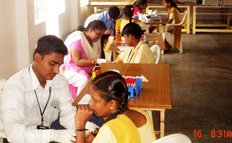SPADES is for School and College goes in Vellore district and was initiated to address non-communicable health problems like obesity, metabolic syndrome and diabetes affecting school children.
 Obesity and the metabolic syndrome have reached epidemic proportions in our country and is negatively affecting the health of several children attending schools and colleges. The prevalence of obesity (being overweight) and the metabolic syndrome (which includes abnormal plasma glucose values, elevated cholesterol, and a big belly) are becoming high among children. This places them at a high risk of developing diabetes or cardiovascular disease at a much younger age. This increasing prevalence can be attributed to the fact that eating habits among children have taken a twist towards junk food and healthy eating has been forgotten. A lack of physical activity especially among exam goers has minimized physical exertion to burn the calories consumed. The imbalance between high calorie consumption and physical inactivity has placed children at a high risk of developing disorders which was once thought to be common only in the middle aged and the elderly.
Obesity and the metabolic syndrome have reached epidemic proportions in our country and is negatively affecting the health of several children attending schools and colleges. The prevalence of obesity (being overweight) and the metabolic syndrome (which includes abnormal plasma glucose values, elevated cholesterol, and a big belly) are becoming high among children. This places them at a high risk of developing diabetes or cardiovascular disease at a much younger age. This increasing prevalence can be attributed to the fact that eating habits among children have taken a twist towards junk food and healthy eating has been forgotten. A lack of physical activity especially among exam goers has minimized physical exertion to burn the calories consumed. The imbalance between high calorie consumption and physical inactivity has placed children at a high risk of developing disorders which was once thought to be common only in the middle aged and the elderly.
 This comprehensive project entails orienting teachers and students to the disease prevalence and importance of Metabolic Syndrome and Diabetes amongst youngsters and how to handle these issues especially in relevance to life style modification. The aim of such a programme is based on our belief that health interventions among students can bring about huge behavioral effects. Children will benefit most from health interventions, since they are likely to show the greatest improvements in attendance and learning achievement and we believe that education and screening of students is the most cost effective strategy that can link health resources and practices in prevention of health related problems.
This comprehensive project entails orienting teachers and students to the disease prevalence and importance of Metabolic Syndrome and Diabetes amongst youngsters and how to handle these issues especially in relevance to life style modification. The aim of such a programme is based on our belief that health interventions among students can bring about huge behavioral effects. Children will benefit most from health interventions, since they are likely to show the greatest improvements in attendance and learning achievement and we believe that education and screening of students is the most cost effective strategy that can link health resources and practices in prevention of health related problems.
 Through SPADES students the students are aided to recognize high risk behaviour, factors and conditions that affect their future health. This motivational approach helps students to develop and demonstrate increasingly sophisticated health-related knowledge, attitudes, skills, and practices in maintaining and improving their health, prevent disease, and reduce health-related risk behaviour. This basic educational strategy also extends formal medical knowledge to children of all communities which may not be affordable by many.
Through SPADES students the students are aided to recognize high risk behaviour, factors and conditions that affect their future health. This motivational approach helps students to develop and demonstrate increasingly sophisticated health-related knowledge, attitudes, skills, and practices in maintaining and improving their health, prevent disease, and reduce health-related risk behaviour. This basic educational strategy also extends formal medical knowledge to children of all communities which may not be affordable by many.
 In SPADES, schools and colleges who are willing to accommodate a day in educating their students about diabetes and the metabolic Syndrome are identified. The target age groups are 14–24 years. Blood samples are drawn for fasting blood glucose, fasting lipid profile and 2hours post meal sugars. Examination and involve the basic anthropometric measurements like height, weight, waist-hip ratio, skin fold thickness, blood pressure and general examination. This is followed by an open discussion and education on various aspects of Diabetes and Metabolic Syndrome.
In SPADES, schools and colleges who are willing to accommodate a day in educating their students about diabetes and the metabolic Syndrome are identified. The target age groups are 14–24 years. Blood samples are drawn for fasting blood glucose, fasting lipid profile and 2hours post meal sugars. Examination and involve the basic anthropometric measurements like height, weight, waist-hip ratio, skin fold thickness, blood pressure and general examination. This is followed by an open discussion and education on various aspects of Diabetes and Metabolic Syndrome.
 Through SPADES 9 schools and over 1490 children have been covered. The preliminary observations have been quite revealing. We have noticed that HDL (good cholesterol) that protects us from cardiac disease is relatively lower in this age group placing them at a higher risk of developing a problem later on in life. The prevalence of the metabolic syndrome is roughly estimated to be around 40% which implies that there are a significantly higher proportion of children who are over weight, have elevated blood pressure or cholesterol or impaired glucose function.
Through SPADES 9 schools and over 1490 children have been covered. The preliminary observations have been quite revealing. We have noticed that HDL (good cholesterol) that protects us from cardiac disease is relatively lower in this age group placing them at a higher risk of developing a problem later on in life. The prevalence of the metabolic syndrome is roughly estimated to be around 40% which implies that there are a significantly higher proportion of children who are over weight, have elevated blood pressure or cholesterol or impaired glucose function.
 This high proportion of students effected needs active intervention in terms of healthy eating habits and incorporation of routine physical activity everyday. Even schools will have to incorporate regular sports and exercise programmes rather than have exclusive text book and classroom academics. The adoption of the simple life style modification would have a positive impact on their health and reduce their risk of subsequent health problems at a much younger age group.
This high proportion of students effected needs active intervention in terms of healthy eating habits and incorporation of routine physical activity everyday. Even schools will have to incorporate regular sports and exercise programmes rather than have exclusive text book and classroom academics. The adoption of the simple life style modification would have a positive impact on their health and reduce their risk of subsequent health problems at a much younger age group.
This venture would definitely have a positive health impact among children. Indirectly, the message is also carried to their parents who will  also be influenced by this message. The accompanying teachers will also benefit from the educational programmes being given and are likely to pass this message vertically to their students in subsequent classes.
also be influenced by this message. The accompanying teachers will also benefit from the educational programmes being given and are likely to pass this message vertically to their students in subsequent classes.
The entire venture is conducted be a team of doctors, pharmacists and diabetes nurse educators under the leadership of Dr Senthilvasan form the Department of endocrinology.


